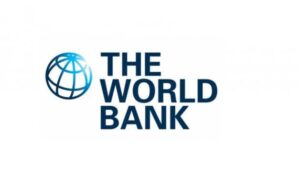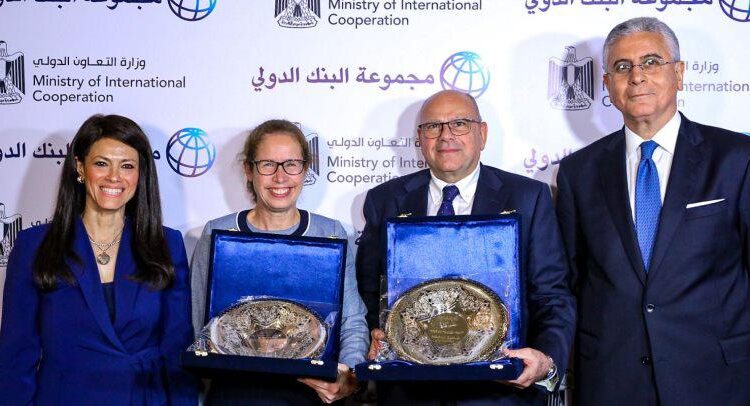
by Youssef Debakey
In the following report, Ministry of Co-operation reviews the most important aspects of relations with the World Bank Group (WBG) and its affiliated agencies, taking the chance of the launch of the Country Partnership Framework 2023/2027.
The WBG was established in 1944 and then turned into a multilateral group affiliated with a number of institutions that aim to promote and support development in developing nations.
Egypt is a founding member of the group. It is also its third largest shareholder in the Middle East and North Africa.
The interconnection between Egypt and the WBG has been appertaining to strong relations between the two sides since the international lender’s inception.
These relations have rested on the efforts and the role of the group in backing development efforts in developing countries.
The WBG is one of Egypt’s most important development partners. It started supporting Egypt’s development programme in 1959. Since then, the group has financed 175 projects in Egypt, with an estimated $26 billion in many important sectors, including infrastructure and capital, human rights, public sector reforms, service provision, and private sector development.
These projects aim to enhance institutions and achieve economic reforms and sustainable development to ensure that future generations will have the tools necessary for success. They also aim to improve the quality of life for Egyptians.

Approval of strategic partnership framework with WBG
The new strategy with the WBG for 2023-2027 will support future joint co-operation programmes and projects.
The Country Partnership Framework (CPF) was approved on March 21, 2023 by the Board of Executive Directors of the bank to support efforts to achieve comprehensive and sustainable growth, based on national priorities in various sectors and the development vision over the next five years.
The new strategy of the group is consistent with the Governments of Egypt’s national initiatives and presidential initiatives, including Egypt’s Vision 2030 and the National Climate Change Strategy 2050.
Strategy’s effects on development efforts in Egypt
The new CPF aims to support Egypt in building innovative paths and sustainable solutions to address development challenges in various sectors, foremost of which the eradication of poverty, the promotion of comprehensive prosperity for all segments of society, and the creation of conditions conducive to achieving comprehensive, sustainable and resilient green development.
The CPF places the Egyptian citizen at the core of the development process in pursuit of three main objectives:
- Increasing private sector jobs by supporting the creation of an empowering environment for private sector-led investments and job opportunities
- Enhancing human capital outcomes through the provision of inclusive, impartial and refined health and education services as well as effective social protection programmes
- Improving resilience to shocks by strengthening macroeconomic management, and climate change adaptation and mitigation measures
Co-operation portfolio with the IBRD
Fifteen projects are currently funded by the International Bank for Reconstruction and Development (IBRD) with a total value of $7.33 billion in various sectors, including social protection, health, nutrition, population, education, environment, food security and urban development. These projects will advance economic reform and sustainable development in Egypt.
The development co-operation portfolio with the bank is divided into several sectors, namely financing, competitiveness and innovation, which accounts for 16 per cent of the portfolio, social protection and employment promotion at 19 per cent, health, population and nutrition at 13 per cent, transportation at 11 per cent, water at 12 per cent, agriculture and food security at 7 per cent, education at 7 per cent, urban development and resilience at 7 per cent, macroeconomics, trade and investment at 5 per cent, environment, natural resources and the blue economy at 3 per cent.
Most prominent projects implemented in partnership with the WGB
Projects currently implemented in partnership with the WBG aim to support entrepreneurs and small and medium enterprises, such as the air pollution and climate change management project in Greater Cairo and the local development project in Upper Egypt.
Is co-operation with the WBG limited to development funds?
The issuance of diagnostic and analytical reports is one important area of co-operation with the WBG. These reports aim to formulate a clear vision of the Egyptian economy and analyse its current situation.
The Country Climate Development Report (CCDR) was launched last year. The report identifies measures at the level of policies and investment opportunities that can be implemented within five years. It will lead to a more efficient use and allocation of natural resources, reduce the effects of climate change on citizens, companies and business establishments, and enhance Egypt’s ability to compete in global markets.
Aspects of co-operation with the WBG in its development road map
Among other things, the spring meetings in Washington focused on the development roadmap of the WBG, where the Board of Executive Directors of the group, in coordination with its management, prepared a development roadmap to more effectively address accelerating development challenges.
Egypt is an active participant in the discussion of the roadmap which aims to address development challenges, most notably the increase in poverty rates worldwide, especially in middle-income countries, as well as common prosperity and cross-border challenges, including climate change, epidemics, conflict and violence.
Axes for developing role of WBG
- The WBG’s development plan is based on reformulating its mission to “end extreme poverty and enhance shared prosperity by promoting sustainable, resilient and inclusive development”.
- The operational model pillars include supporting results at the country level in a way that addresses global challenges, improving the scope of development impacts, and creating a stronger operational capacity to respond to crises.
- The focus of the financial model includes enhancing the financial capacity of the group and its financial model, in co-operation with various economic groups, including the G20 (Basic Set of Financial Inclusion data repository includes detailed data from users and providers of financial services).
How do relations with the WBG enhance private sector empowerment efforts?
In parallel with Egypt’s vision and efforts to empower the private sector, work is being done with the institutions affiliated with the WBG, namely the International Finance Co-operation (IFC) and the Multilateral Investment Guarantee Agency (MIGA), to enhance investments for the private sector and support green financing.
The IFC’s investment portfolio in Egypt has reached $1.5 billion, which is directed to vital sectors, such as renewable energy, industry, education, health, women’s empowerment, and the financial sector.
Through co-operation with MIGA, over $470 million in guarantees has been invested in over 17 current projects in the infrastructure, manufacturing and renewable energy sectors.







Discussion about this post